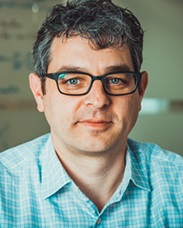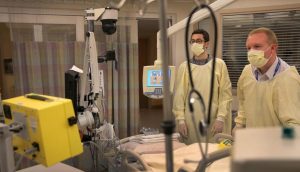Bio
“Taking (Small) Models to the Point of Care”
 Thomas Heldt studied physics at Johannes Gutenberg University, Germany, at Yale University, and at MIT. He received the PhD degree in Medical Physics from MIT’s Division of Health Sciences and Technology and undertook postdoctoral training at MIT’s Laboratory for Electromagnetic and Electronic Systems. Prior to joining the MIT faculty in 2013, Thomas was a Principal Research Scientist with MIT’s Research Laboratory of Electronics. He currently holds the W.M. Keck Career Development Chair in Biomedical Engineering. He is a member of MIT’s Institute for Medical Engineering and Science and on the faculty of the Department of Electrical Engineering and Computer Science.
Thomas Heldt studied physics at Johannes Gutenberg University, Germany, at Yale University, and at MIT. He received the PhD degree in Medical Physics from MIT’s Division of Health Sciences and Technology and undertook postdoctoral training at MIT’s Laboratory for Electromagnetic and Electronic Systems. Prior to joining the MIT faculty in 2013, Thomas was a Principal Research Scientist with MIT’s Research Laboratory of Electronics. He currently holds the W.M. Keck Career Development Chair in Biomedical Engineering. He is a member of MIT’s Institute for Medical Engineering and Science and on the faculty of the Department of Electrical Engineering and Computer Science.
Thomas’s research interests focus on signal processing, mathematical modeling and model identification in support of real-time clinical decision making, monitoring of disease progression, and titration of therapy, primarily in neurocritical and neonatal critical care. In particular, Thomas is interested in developing a mechanistic understanding of physiologic systems, and in formulating appropriately chosen computational physiologic models for improved patient care. His research is conducted in close collaboration with clinicians from Boston-area hospitals, where he is integrally involved in designing and deploying high-quality data-acquisition systems and collecting clinical data.
 Click here to view webcast.
Click here to view webcast.
Abstract
“Taking (Small) Models to the Point of Care”
 Large volumes of heterogeneous data are now routinely collected and archived from patients in a variety of clinical environments, to support real-time decision-making, monitoring of disease progression, and titration of therapy. This rapid expansion of available physiological data has resulted in a data-rich – but often knowledge-poor – environment. Yet the abundance of clinical data also presents an opportunity to systematically fuse and analyze the available data streams, through appropriately chosen mathematical models, and to provide clinicians with insights that may not be readily extracted from visual review of the available data streams.
Large volumes of heterogeneous data are now routinely collected and archived from patients in a variety of clinical environments, to support real-time decision-making, monitoring of disease progression, and titration of therapy. This rapid expansion of available physiological data has resulted in a data-rich – but often knowledge-poor – environment. Yet the abundance of clinical data also presents an opportunity to systematically fuse and analyze the available data streams, through appropriately chosen mathematical models, and to provide clinicians with insights that may not be readily extracted from visual review of the available data streams.
In this talk, I will highlight our work in model-based signal processing to derive additional and clinically useful information from routinely available data streams. In the first part of the talk, I will present our model-based approach to noninvasive, patient-specific and calibration free estimation of intracranial pressure, and will elaborate on the challenges of collecting high-quality clinical data for validation. In the second part of the talk, I will present our work on extracting clinically meaningful and actionable information from the shape of the capnogram, with applications to differentiating respiratory and cardiac causes of shortness of breath.
 Click here to view webcast.
Click here to view webcast.